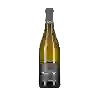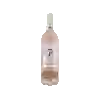
Winery Cellier des PrincesArôma Rosé
This wine generally goes well with beef, lamb or mature and hard cheese.
Food and wine pairings with Arôma Rosé
Pairings that work perfectly with Arôma Rosé
Original food and wine pairings with Arôma Rosé
The Arôma Rosé of Winery Cellier des Princes matches generally quite well with dishes of shellfish, appetizers and snacks or lean fish such as recipes of crab matoutou, lightweight microwave chips or fish soup.
Details and technical informations about Winery Cellier des Princes's Arôma Rosé.
Discover the grape variety: Folignan
Folignan blanc is a grape variety that originated in France (Languedoc). It produces a variety of grape specially used for wine making. It is rare to find this grape to eat on our tables. It should be noted that this variety can also be used for the elaboration of eaux de vie. Folignan blanc can be found cultivated in the following vineyards: South-West, Cognac, Bordeaux, Provence & Corsica, Rhone Valley.
Informations about the Winery Cellier des Princes
The Winery Cellier des Princes is one of of the world's great estates. It offers 94 wines for sale in the of Vaucluse to come and discover on site or to buy online.
The wine region of Vaucluse
The wine region of Vaucluse is located in the region of Méditerranée of Vin de Pays of France. Wineries and vineyards like the Domaine Chêne Bleu or the Domaine Chêne Bleu produce mainly wines red, white and pink. The most planted grape varieties in the region of Vaucluse are Viognier, Merlot and Cabernet-Sauvignon, they are then used in wines in blends or as a single variety. On the nose of Vaucluse often reveals types of flavors of earthy, blueberry or dried herbs and sometimes also flavors of savory, anise or cinnamon.
The wine region of Méditerranée
Méditérranée is a PGI title that covers wines produced in a large area of the South-eastern coast of France, roughly corresponding to the wine region of Provence but also including Part of the Rhône Valley. The PGI shares its territory with multiple AOC appellations as varied as Châteauneuf-du-Pape, Bandol and Côtes de Provence. The PGI Méditérranée catchment area extends over 10 departments (including the two on the island of Corsica), as well as smaller parts of the Isère, Loire and Rhône departments. Viticulture is essential to the culture and economy of this part of France.
The word of the wine: Astringency
Chemical stimulation that tightens the mucous membranes of the mouth and causes a sensation of harshness, which is characteristic of the presence of tannins. With time, the tannins lose their harshness and become softer.














